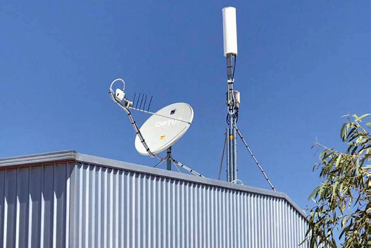Mobile phone service most people take for granted; however, don’t tell that to small town residents of the Australian outback who, until recently, had never been able to use their mobile phones to make a call, check their Facebook account or consult an online map.

Thanks to Optus, Australia’s second largest mobile operator, and Gilat Satellite Networks, this situation has begun to change for the many previously unserviced outback communities.
Optus has rolled out mobile coverage for local residents and visitors across locations in South Australia and the Northern Territory. These groundbreaking deployments use innovative small cell and satellite technologies from Gilat Satellite Networks.
Making Mobile Black Spots a Thing of the Past
Optus has made a substantial investment and commitment to deliver mobile connectivity to their customers in remote and underserved regions of Australia. In conjunction with that nation’s Mobile Black Spot program, Optus has embarked upon a major infrastructure project designed to extend their mobile network to black spots in South Australia and elsewhere across the country.
In addition to bringing mobile and broadband services to local residents, this project is expected to drive significant economic benefits for these communities. Mobile coverage will attract more tourists, traveling workers and truckers who will to stop in these communities to check in at home or with their offices, send pictures and consult online maps. Longer stays means more dollars for local establishments.
To turn this vision into reality, Optus needed a cost-effective way to overcome the long distances and topographical challenges related to extending their mobile network to these outlying areas. Accordingly, the company sought innovative technologies that would allow for the connection of these remote sites to the core cellular network, all with a minimum of deployment time and costs.
Gilat’s Integrated Small Cell Over Satellite Solution
With these requirements in mind, Optus selected Gilat’s CellEdge SDR (Software Defined Radio) Small Cell Over Satellite solution to deliver 3G cellular coverage to remote regions throughout Australia.
Small cell technology provided a cost-effective, compact and easy-to-deploy alternative to large and expensive mobile towers, while backhaul over satellite enabled Optus to leverage their existing satellite network.
Based on the success of the initial deployments in 15 sites in South Australia, Optus plans dozens of similar deployments along some of the major highways of the Northern Territory and Western Australia. In addition to bringing mobile and broadband services to Optus subscribers in outback communities for the first time, these deployments also increase the safety of tourists and stranded motorists by enabling them to make emergency calls from any mobile phone.
“Gilat’s Small-Cell-Over-Satellite solution enables us to provide mobile connectivity to unserved and underserved areas,” said Paul Sheridan, Vice President, Optus Satellite. “This is an innovative and cost effective solution to address our requirements for delivering a high quality user experience, under challenging environmental conditions in regional Australia.”
Gilat’s CellEdge SDR (Software Defined Radio) solution integrates an outdoor Small Cell for 3G networks with a field-proven and highly efficient satellite-based cellular backhaul solution. With these SDR capabilities, CellEdge can transmit two carriers from the same box simultaneously and enables seamless migration from 3G to 4G, as required.
Optimized for satellite backhaul, Gilat’s CellEdge Small Cell Over Satellite solution delivers the same speed and quality as a terrestrial backhaul solution. CellEdge SDR uses the open standard Iuh interface, enabling satellite bandwidth optimization for high efficiency and data rates.
Gilat’s cellular backhaul solution consists of VSATs installed at each small cell site and an advanced hub platform at Optus’ satellite network hub. Gilat’s VSAT technology ensures an outstanding user experience for Optus customers through the use of patented embedded acceleration techniques over GTP/TCP to overcome inherent satellite delay.
Using Gilat’s CellEdge solution, Optus has found a highly efficient way to introduce mobile and broadband services in challenging and potentially expensive locations. The compact Small Cell enables quick and easy deployment on almost any existing structure, as opposed to building a large and costly mobile base station. Simultaneously, Optus can use Gilat’s VSAT technology and the existing satellite network for backhaul rather than having to establish microwave or fiber connections.
In terms of cost savings, Gilat’s solution has allowed Optus to reduce CAPEX through low-cost equipment and low installation costs, while also lessening OPEX by reducing satellite bandwidth costs.
gilat.com/

Doreet Oren (doreeto@gilat.com) is Director of Product Marketing for Gilat Satellite Networks and has been performing in this role since 2012. She has also has been responsible for defining product positioning, messaging, go-to-market strategies, market research, and analyst relations.
Oren has more than 20 years of industry experience and has held management positions in R&D, product management and product marketing for international high-tech companies. In this capacity, she contributed to next-generation product definition and was responsible for delivering the company’s vision to the media and analyst community. Oren has published thought leadership articles in renowned international journals, and has spoken at numerous industry conferences worldwide. Oren received a BSc in Computer Science from George Washington University.


